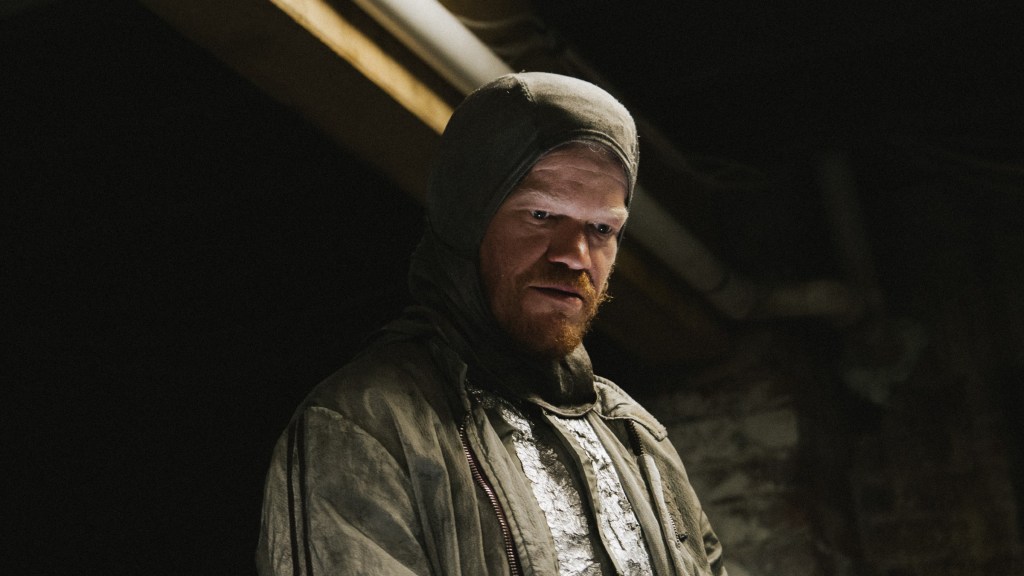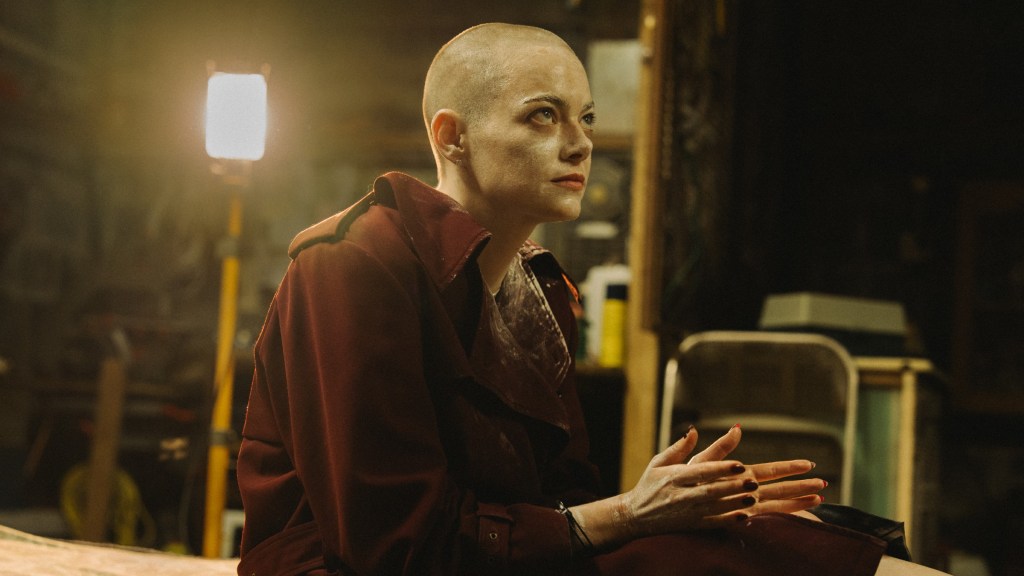Director Yorgos Lanthimos has been on a tear in recent years, collaborating with Oscar-winner Emma Stone on four films in a row with The Favourite, Poor Things, Kinds of Kindness, and now, Bugonia. In the film, an English remake of a 2003 black comedy from South Korea, Stone stars opposite another of our best performers of the era in Jesse Plemons, giving a combo made in a lab for film fans. With a tight-knit cast and a small focus, despite its intergalactic implications, Bugonia gives way to a tense drama that has science fiction lurking under its skin. It’s a film that reminds us not only how great its two leads are as performers but also how Lanthimos himself is capable of getting back to basics to great effect.
Videos by ComicBook.com
Plemons stars in Bugonia as Teddy Gatz, a rural man who keeps bees, works at a shipping warehouse, and has also done extensive research into his belief that Andromedon aliens are secretly controlling Earth. Stone plays Michelle Fuller, the powerful CEO of a pharmaceutical company and the target of Teddy’s belief that she’s part of this cabal of extraterrestrials. The stark difference in the two characters is seen immediately, as Teddy’s quaint home in rural Georgia is showcased beside Michelle’s gigantic modern home, making a class distinction written in neon. Married to his convictions, Teddy hatches a plan to kidnap Michelle, convinced of her alien origins and planning to exploit it to make contact with the aliens themselves.
Across his recent films, Yorgos Lanthimos’ aesthetic approach has only gotten bigger, with The Favourite and Poor Things arriving as bold and expressive creations with giant sets and bizarre costumes. With Bugonia, he blends the absurdist stylings he’s become known for, grounding much of the film in a more realistic way but knowing the exact right moments to deploy his maximalist sensibilities. In that way, it’s a movie unlike anything else you’ll find in theaters this year, blithely confident in its story and knowing the moments it can flaunt style to the viewer; at no point is it unclear that this is a Yorgos picture.
Rating: 4 out of 5
| PROS | CONS |
| A whip-smart screenplay with great structure | Sometimes loses focus |
| Stone & Plemons remain undefeated as performers | The humor doesn’t always land |
| Always surprises you |
Bugonia’s Script Is Its Secret Weapon

The unique thing about Bugonia positioning its two leads as the main voices of the film is that it forces the audience to routinely consider the reality of the world that it’s set in. Teddy’s fringe ideals immediately put him at arm’s length from the audience, who can see the blurred similarities between his ramblings about aliens and their control of Earth’s population with actual modern conspiracy babble. By delivering this immediately, Stone’s character doesn’t even have to offer any real rebuttals to his claims; everything he says sounds demented, though delivered with the kind of confidence that can’t be bought. Instead, she can throw out a trademark Stone exasperated glance, and her side of the discussion is clear.
That’s not to say that Bugonia doesn’t interrogate the larger questions presented by Teddy, or the refuting that Michelle offers, but it allows the audience to germinate in the scenario and the characters before making them focal points. As the story itself evolves and Michelle begins to open up to Teddy, even entertaining his ideas to try and win him over, the structure of Bugonia makes itself clear; there’s no way this thing is going down the path you’re expecting. Once you think you’ve got an idea of the direction it’s treading, and where its characters’ minds are at any given moment, the film makes the case to you that its unpredictability is its secret weapon.
Despite this rigid structure that evolves briskly, there are times when Bugonia meanders. Scenes where Teddy is confronted by the outside world, be it in his job or in the surprise appearances by Stavros Halkias, sometimes impact the tempo of the film, despite contributing to its humorous palette. These moments are built in to allow the audience a breath from some of its more intense moments, and to see the outside perspective of Michelle’s disappearance, but they do slow down the film to its detriment at times.
Bugonia Is a Showcase For Its Stars

Stone and Plemons are the driving forces of the film, and their performances are the fuel of Bugonia‘s fire. On one side is Plemons, who manages to dictate his delirious worldview with aplomb, to the point that the audience can not only see how he might fall down this conspiracy rabbit hole but actually begin to believe what he’s saying. Plemons has a spitfire conviction in his performance, balancing the emotions of his obsession with his personal strife, which works in tandem with Stone’s steadfast confidence. Every time she’s confronted with a wild new observation from Plemons’ conspiracy-laden brain, her reactions evolve from confusion to feigned acceptance. This leads to distinct battles between the two, terse conversations that feel like a heavyweight championship. The winner, of course, is us getting to watch.
Plemons is flanked by newcomer Aidan Delbis, who plays his cousin Don, a reluctant accomplice in the kidnapping and interrogation of Stone’s character, offering a distinct third perspective to the larger plot. Delbis is quite funny in the role, consistently unsure about the truth of his cousin’s ideas and the root in his heart that tells him something is wrong. It’s an impressive debut for him, as he stands alongside an Oscar winner and nominee and holds his own.
For the most part, the movie is these three performers. There are, however, memorable appearances by both Alicia Silverstone and Stavros Halkias that round out the rest of the film. Silverstone plays Teddy’s mother, Sandy, a woman whose history with drugs is one of the contributing factors to his current ideals, and delivers one of its most memorable scenes. Halkias also uses his cherubic demeanor to great effect, even if the larger joke of his character’s place in the script is one that doesn’t fully land.
At its core, Bugonia is a film about living right now. Even if its two central characters occupy distinct places in the world, ones that are on opposite ends of fringe ideals (a conspiracy-laden worldview vs. a 1%), it remains a distinct look at where we are and what it feels like to be lost in the storm. Despite these larger motifs at work, Bugonia‘s small scope is its key asset, which allows it to blossom as its lead characters clash and its narrative expands in ways that always surprise the audience. There’s nothing quite like it.
Bugonia is now playing in theaters.








